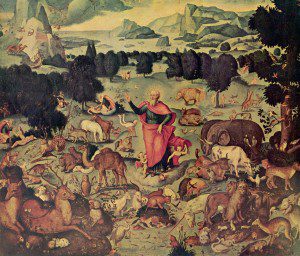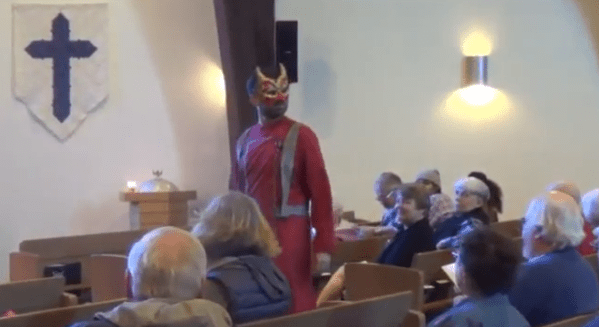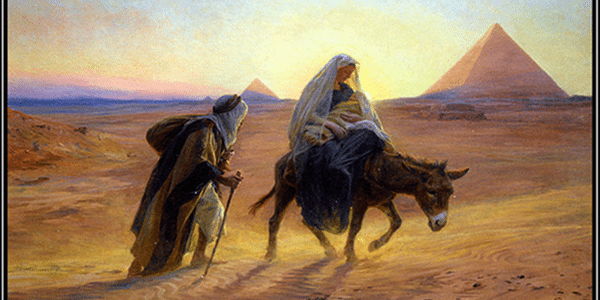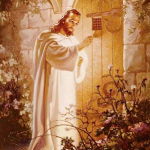Was the Garden of Eden a shared space? The answer seems obvious – yes, God created the garden and then shared it with Adam and then Eve. But there’s that little problem of the tree that God didn’t want to share. “You may freely eat of every tree of the garden,” God told his newly created companions. “But of the tree of the knowledge of good and evil you shall not eat, for in the day that you eat of it you shall die.” So which is it? Was God a generous God, sharing unconditionally with Adam and Eve, or was he selfish, holding back the most valuable treasure for himself? Did this “yes, but” command of God make a mockery of sharing?
Interpreters of Genesis 2 have often seen God’s “these trees, but not this tree” command as a test of Adam and Eve’s faithfulness. After all, they could have every other fruit in the garden, so by commanding “not this fruit” God was not giving them a difficult test; it’s one he was hoping they would pass easily. Or the prohibition is understood as an act of kindness from a benevolent father who restricts access to dangerous things for his children’s own good. Only God can handle the knowledge of good and evil without risking death, and so we are better off without it. Mimetic theory has contributed to this argument by pointing out that when we divide the world up into good and evil, we often do so as a justification for hatred, exclusion and violence. It seems we always place ourselves among the good (right alongside God) and those we disagree with among the evil (as enemies of God). Insisting on dividing the world up this way is what destroyed Eden so that, in a way, we expelled ourselves from God’s nonjudgmental, all-loving presence.
But I have a gnawing disquiet with this reasoning. Why did God have to point out such a big difference between the Creator and his creatures? Adam and Eve had no delusions of godhood that I can discern in the text. They didn’t seem to think they were anything other than creatures who were the happy beneficiaries of a benevolent Creator’s urge to share everything he had with them. The prohibition seems like an accident waiting to happen, an unnecessary correction to Adam and Eve’s lack of ambition to be anything than what they were.
I recently encountered an explanation of “shared space” in the context of peacebuilding efforts in Northern Ireland that may shed some light on God’s apparent waffling on the sharing thing. At a Methodist Community center in Belfast, the director explained the difference between “shared space” and “neutral space”. Neutral space is the easiest to understand. Think of a neutral zone between combatants where no fighting takes place. A truce is also a kind of neutral space, but carved out in time. Creating a neutral zone or time of truce doesn’t mean that hostilities have ended, only that for this time or in this space they are suspended. A neutral space can look peaceful because no one is killing or being killed. But though the guns are silenced, the hostility remains.
Shared space is very different because it’s not neutral. Shared space involves an invitation to join you in your space. If it’s not yours, you can’t share it with someone! Think of the difference between inviting an adversary to meet you at a restaurant or to join you for dinner at your home. You might be civil to each other in a restaurant, but in your home you are more likely to become friends. Inviting someone into your home is an act of faith in the good intentions of the other, a faith that must be reciprocated for the invitation to be accepted. Shared space does more than suspect hostilities; it creates the conditions for authentic peace to be co-created.
So what does this have to do with the Garden of Eden? I’m not completely sure, but I’m beginning to wonder if God’s apparently selfish prohibition isn’t a sign to us that the Garden was not neutral space. It was God’s space to do with as he pleased. By saying “this is my tree”, God is telling Adam and Eve, “this is my garden”, which is a condition for God to be able to share the garden with them and with us. God did not create Adam and Eve to be acquaintances he would occasionally meet for dinner in a restaurant or wave hello to as he passed them on the street. God created Adam and Eve to be his friends and inviting them into his garden was and is the condition for that friendship to flourish. When the friendship frays and is tested by mistrust, betrayal, rivalry and lies, the surest route to reconciliation is an invitation from God to come back to his garden. Perhaps the rest of Scriptures is nothing more than God’s ongoing invitation for us to join him in his home, which is neither neutral nor evil, but as good as it gets.
















